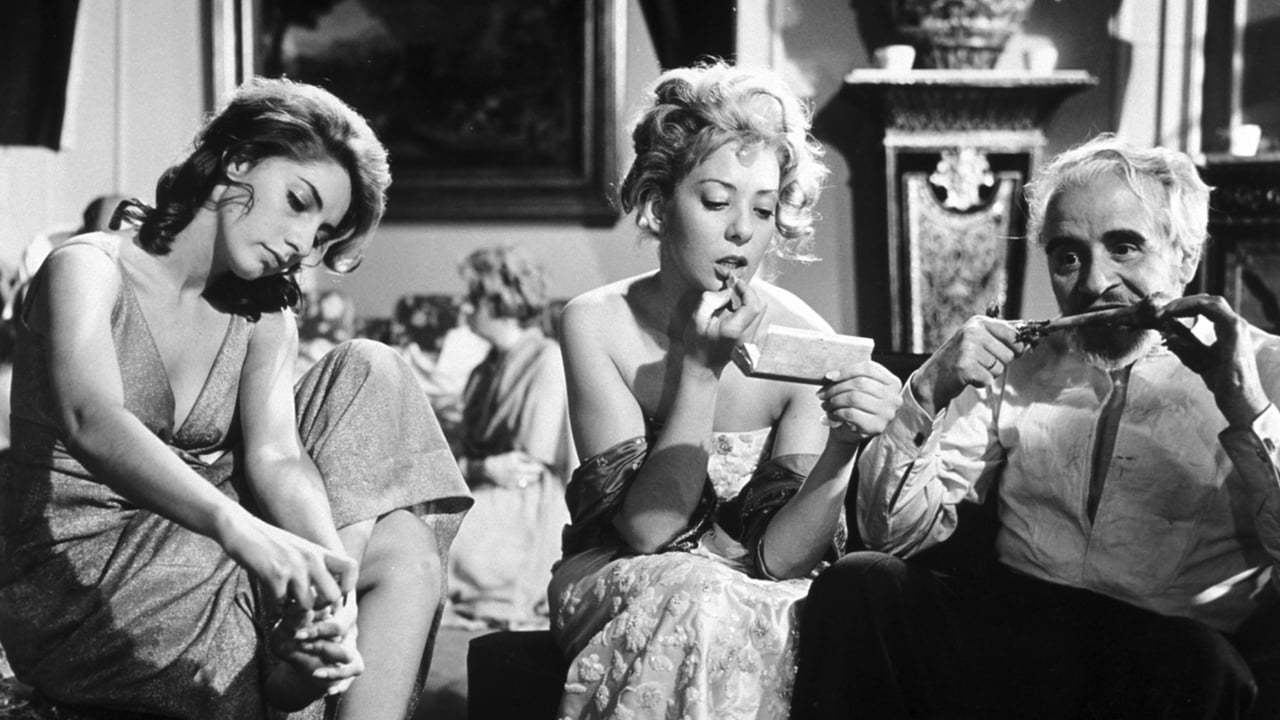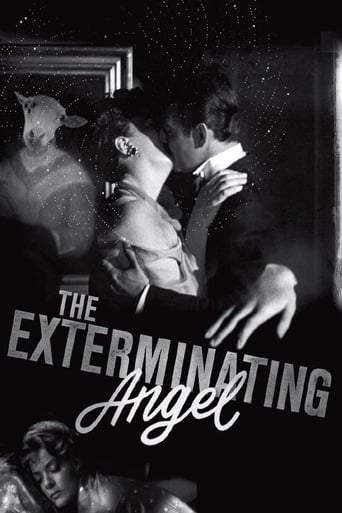



disgusting, overrated, pointless
While it doesn't offer any answers, it both thrills and makes you think.
View MoreThe movie is wonderful and true, an act of love in all its contradictions and complexity
View MoreThrough painfully honest and emotional moments, the movie becomes irresistibly relatable
View MoreDue to the simplicity of the conflict this film lends itself to countless interpretations. It is, therefore, a movie to be thought while being seen. A challenge, a riddle without a solution. A seed of conversation and reflection. In some sense, The Exterminating Angel is a fairy tale, a simple expression of an atom of drama, as deeply irrational as fortune and, overall, life. It is here where the surrealists come in, to show us that irrationality directly, to display that universal strangeness which we like to adjudge to dreams, although its origin actually escapes us. The movie does indeed feel like a dream and, more relevant in my opinion, like a feeling, an expression of that trick we all know, when the mind suffers for something that its actually easily solvable, but the action just never arrives, blocked somehow by a guard that tells us that life without tension is not life. In the movie, the scenes that take you out of this mind prison sadly release this tension, and thus the play looses some of the precious pressure that so skillfully builds; it is anyway a masterpiece, an excellent portrait of the common ineffable.
View MoreA Bruñuel school's invitation is always becoming for any cinephile's reservoir, currently this film marks my fourth entrance into his territory after the lesser approachable THE MILKY WAY (1969, 6/10), THE EXTERMINATING ANGEL is an outstanding surrealism allegory, Bruñuel maneuvers a sleight of hand with sheer simplicity, the entire story is predominantly crammed in a living room of a regal mansion, the owners Lucía (Gallardo) and Edmundo (Rambal) host a dinner party for 20 middle-class guests. Bizarrely the party never ends, all of them, with the steward Julio (Brook) are incarcerated in the living room, whoever intends to get out of the room, will involuntarily alter his mind to stay, meanwhile for the people outside, the same mysteriously inexplicable force hedges them from entering too. Trapped in this claustrophobic space, the coexistence turns sour with time ruthless consuming the sustenance, the energy and the etiquette, simultaneously squabbles, vituperation, oneiric hallucinations, suicidal tendency and roughhousing all come to the fore (Bruñuel could go to extreme with cannibalism but he chose to refrain), the procedure of everyone takes off their facade and betrays their true self is excruciatingly riveting, the film could scale new heights as a superb probing essay on human nature if Bruñuel cared to exhume deeper to each character's meaty back-story (the fraternal hint, the flirtatious lady with terminal cancer, the undercurrent of adultery between the hostess and the Colonel, a votive trip to Lordes, the before/after reaction of taking the ulcer pills, not to mention the "La Valkiria" Leticia played by the first-billed Silvia Pinal, there are a slew of untold scandals are in need of elaboration). Instead the upshot is executed with a much murkier distinction, conspicuously they are all pawns in Bruñuel's storybook, it is rather an exacting task to distinguish all the different roles from a first-viewing, if only Robert Altman would do a remake, and expunge the political metaphor of the ending, then it would be transformed into a highly-watchable character analysis and an incisive farce with eye-dropping theatrical showpieces.Of course Bruñuel's mastery is omnipresent in the film, the superimposition shot of a clear sky upon a facial portrait, the outlandish amalgam of lambs and a baby bear, and the creative approach to offer a vent to let them out (a Paradisi's sonata is the turning point), until the climax, we all realize it is just a trial run, and the denouement is a dual indictment on undiscerning religious belief and the political status quo at then, pepped up with a palpable feeling of hopelessness. Also the slap to the bourgeois is loud and clear since the film's opening, it is the servants who are sentient of the pending uncanniness, and urge to leave the house as soon as possible, only the obtuse are being entrapped by the almighty trickster. Then what happens to the hoi polloi in the church? The purge is more generic or we should merely stop over-interpretation? Anyway who needs a concrete answer as long as Bruñuel is concerned.
View MoreMade in 1962, THE EXTERMINATING ANGEL is a highly complex film to watch, despite is ostensibly straightforward story. A group of rich people gather together in a large house for a party, but find themselves unable to escape. Deprived of their basic comforts such as food, water and clothing, they are transformed into savages. Outside the building, people look on in astonishment; while being concerned for the welfare of those trapped inside, they make no efforts to help. Bunuel's film can be seen as an allegory of contemporary society, in which the veneer of civilization is highly superficial. Rich people, just like their less privileged counterparts, are unable to find ways of extricating themselves from difficult situations. Even though they escape at the end, they are subsequently imprisoned in the church: Bunuel shows that nobody, not even established institutions, can help them (or us, for that matter). The film ends with a flock of sheep running towards the church where the people are imprisoned, suggesting that human beings are like lambs to the slaughter. The only way to cope with this inevitable fate is to trust in Providence; hence it comes as no surprise to find the action taking place in Providence Street. THE EXTERMINATING ANGEL needs to be viewed more than once in order to appreciate the subtlety of Bunuel's script, as well as the brilliance of his cinematic technique, but it is well worth the effort.
View More'L'enfer c'est les autres' (Hell is other people), wrote the French existentialist philosopher, Jean-Paul Sartre, in his play, 'No Exit' (sometimes referred to - and has been performed - as 'In Camera'), that surmised the narrative of three deceased individuals locked in a room, one that they eventually realise they will be spending eternity together in. Luis Bunuel used this simple meta-narrative concept of people trapped, to create one of his finest satires, and his first explicitly surrealist film since L'Age D'Or (1930). After Bunuel's previous film, Viridiana (1961), was condemned by the Vatican and banned in his native country of Spain (and where it was made), he moved back to Mexico where he had been making films throughout the 1940's and 50's, and produced a scabrous attack on General Francisco Franco's Spanish fascist dictatorship, and the institutions, and bourgeois facets of the country that were founded on the destruction of the poor and the proletariat, during the civil war that ended in 1939.Whilst the film works as political allegory, on a base narrative level, it functions as an irrational comedy; or farce. The guests arrive for a lavish dinner, but as they arrive, the maids leave, and progressively all the hired help leave them. Once dinner is complete, the guests congregate in the living room, but they all begin to realise that they are unable to leave the room at all. When this is discovered we observe that they attempt to go, but are either distracted or simply stop or break down at the boundary of the room. This continues through days, possibly months - the characters concept of time completely obliterated. The group falls into decay, primitive urges overwhelm them, and as this representation of Western Civilisation breaks down, the group become brutally savage, turning on the host of the dinner, demanding sacrifice. The group slaughter the lambs that were originally to be used in a dinner prank.At first the guests seem to simply ignore what is happening to them, and continue with inane chat. Exterior to the "party", the grounds are surrounded, but not even the police are able to enter, given the same mysterious barrier that prevents entry. It's almost a perfect parable, illustrating the ignorance of the Spanish bourgeoisie, as they strip the rights and dignity of the proletariat (here the maids leave on their arrival), whilst divorcing their minds from the violence and corruption of a dictatorship. But with this, it also shows how even the "civilised" sections of society, once they are stripped of their social status, their inherited manners of "education", and their ability to use wealth, the fall into absolute decay, probably falling apart greater than the lower classes, with their lessened moral outlook, and an almost infantile inability to deal with regular obstacles.Winner of the 1962 Palme d'Or at the Cannes film festival, this was to begin what become (rather belatedly for the 62 year old) his most productive, celebrated and interesting period of his career, based in Paris, beginning with Belle de Jour (1967) and ending with That Obscure Object of Desire (1977). This is the period that he developed and expanded his own style, and his unique vision on film. The Exterminating Angel has also given inspiration for others. It is a clear influence on Jean-Luc Godard's wonderfully bleak and satiric depiction of the bourgeoisie and the end of Western Civilisation, Week End (1967). The idea was also utilised in one sketch from Monty Python's Meaning of Life (1983), that saw the guests leaving as ghosts. This is by far, one of his greatest achievements, beautifully realised, with comic touches, and moments of surrealism that both bemuse and amuse.www.the-wrath-of-blog.blogspot.com
View More